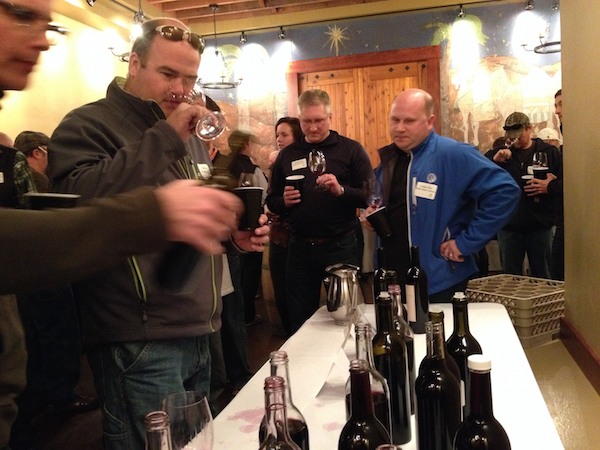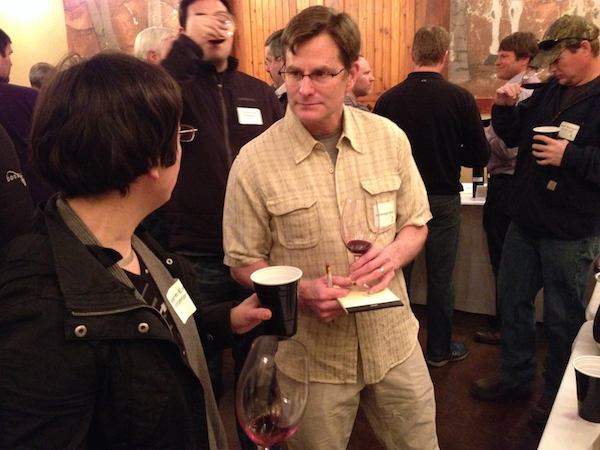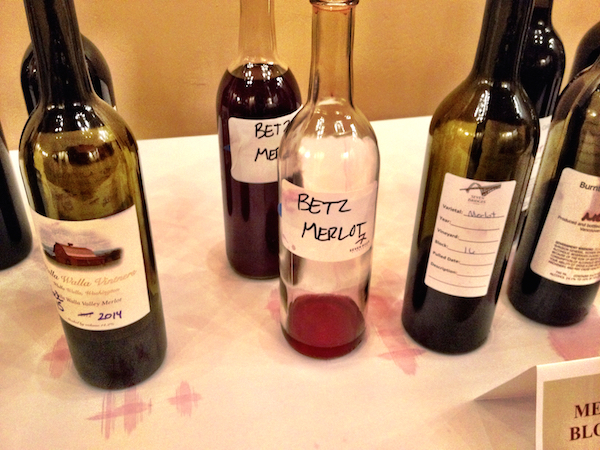
LOWDEN, Wash. — The charming little schoolhouse of L’Ecole No. 41 celebrates its 100th anniversary this year, and the basement turned into a classroom, stock show and juice bar for winemakers and viticulturalists Friday during the 10th annual Seven Hills Vineyard Tasting.
“The format that we like is very casual,” said Marty Clubb, director of winemaking and co-owner of L’Ecole No. 41, as well as a partner in Seven Hills Vineyard. “We don’t really talk about it, but you get an opportunity to taste each block and compare your own wine to other people’s wines, which is kind of fun.”
Sadie Drury, viticulturalist and operations manager for North Slope Management, invited each of her Seven Hills Vineyard customers and encouraged them to bring at least two bottles — labeled by block and variety — to share with the group. More than 50 winemakers and viticulturalists from throughout the Pacific Northwest participated in the tasting of wines made with fruit from one of Oregon’s largest vineyards.
“We were a little crowded this year,” said Drury, who grew up in the Walla Walla Valley and attended Walla Walla Community College’s Viticulture and Enology program. “We sell grapes to 50 wineries, and all 50 wineries were invited. And each winery could bring as many people as they wanted.”
Norm McKibben, the Bay Area engineer who retired then became one of the pillars of the Pacific Northwest wine industry, celebrated 20 years of ownership in Seven Hills Vineyard in 2014.
“We’re selling more and more to the larger wineries, which holds down the number of invites, but I’m always enthused to see all the younger people in there — the start-ups,” Mckibben told Great Northwest Wine.
Potential customers, such as Willamette Valley Vineyards/Griffin Creek in Turner, Ore., took extensive notes while evaluating samples of a dozen varieties, including Carménère, Grenache, Mourvèdre and Sangiovese.
“People want to know about the blocks, and they can determine here if they want to buy fruit this year,” Drury said. “I don’t have any Cab available this year, and I’ve got a waiting list for Syrah. Kind of everything — except Merlot — has a waiting list this year.”
Mid-November freeze creates concern

Perhaps the biggest topic of conversation during the tasting was the undetermined effect of the mid-November arctic blast felt throughout the Northwest.
One winemaker said the projected range of damage is 30 to 90 percent in some Walla Walla Valley vineyards, depending upon the site. Higher-elevation vineyards such as Seven Hills, which sits from 900 to 1,100 feet, are expected to fare better than others.
“We don’t anticipate any problems,” Drury said. “We were really lucky being at a slightly higher elevation. There are a few blocks at the bottom of the vineyard that we’re just pruning long.”
McKibben didn’t seem so much worried about Seven Hills as he is about his plantings to the northeast at Pepper Bridge and Les Collines — five miles east of Pepper Bridge in the foothills of the Blue Mountains at nearly 1,400 feet — and those of his neighbors at lower elevations.
“This year, for the first time, the vineyards tucked against the mountains got hit,” he said. “The 13th of November. I won’t forget that.
“We’ve pruned to four and five buds depending upon where we are, which I don’t like to do. Usually, it’s two buds,” McKibben added. “I think we’ll get 80-plus percent of a crop, but we’re going to have to work to get those shoot positions back down. And it’s expensive.”
Traditionally, vineyard managers fearing winter kill or bud damage from spring frost won’t sleep soundly until after Mother’s Day. That’s more than two months away.
“This weather is so screwy. My trees in the yard are pushing buds already, and we’re still not out of winter,” McKibben said with a laugh. “And crocuses are coming up, too.”
Seven Hills Vineyard spans 170 acres, 50 blocks

There are 50 blocks within Seven Hills Vineyard, first planted in 1980. The project took off in 1994 when McKibben purchased the property. Within four years, he had partnered with Clubb, Gary Figgins of Leonetti Cellar and Bob Rupar, growing it to 200 acres — 170 acres are planted. It’s a little-known fact that all of Seven Hills Vineyard sits in Oregon.
“I’m a founding member of the Oregon Wine Board, and most people say, ‘What?’ “McKibben said with a hearty laugh.
The work done in the past two years by Drury, both in the vineyard and with customers, continues to make McKibben proud. She’d been commuting more than hour each way from Milton-Freewater, Ore., to Red Mountain near Benton City, Wash., for the opportunity to work at Ciel du Cheval and with acclaimed grower Jim Holmes. Then she and her husband, a Walla Walla Valley firefighter, started their family.
“Jim and I are good friends, and he told me he didn’t want to lose her, but he understood,” McKibben said. “And it will be a cold day in hell before we volunteer to let her go. She’s a good as anybody I’ve ever worked with in the vineyard business at doing long-range strategic planning.”
Rhône varieties, Leonetti 2014 Carménère shine

Many of the wines — such as the Leonetti Cellar sample of 2014 Carménère — already seemed flirtatious. The various examples of Syrah were inky and jammy, while the lots of Grenache were brilliant with flavors of ripe raspberry and strawberry/rhubarb compote. A couple showed signs of reduction, while the majority revealed a purity of fruit since they haven’t spent much time in barrel to pick up those aromas, flavors and oak tannin.
“A tasting like this one is very helpful to learn from because there aren’t that many variables involved yet,” said William vonMetzger, winemaker for Walla Walla Vintners. “And if you find something that you like, then you check its availability and see if there’s a way you can get into that block.”
King Estate Winery in Eugene, Ore., looking to grow its North By Northwest label, sent several members of its team — including assistant winemaker Samantha Poehlman — to L’Ecole.
“We’re looking for something for every consumer, and these wines offer a darker, richer palate,” Poehlman said.
Their NxNW portfolio features a red blend ($15) and Columbia Valley Cabernet Sauvignon ($25) that involves Walla Walla Valley fruit, as well as the Walla Walla Valley Cabernet Sauvignon ($55) that’s 60 percent from Seven Hills.
“It’s limited production, and we don’t have any problem selling it,” Ben Howe, vice president of operations, said with a glass in one hand and a stained plastic spit cup in the other.
Howe said he’s participated in the tasting since 2008 and has made the trip nearly every year.
“We’ve stayed with most of the same blocks, but we’ve moved around a little bit here and there,” Howe said. “Sometimes, it’s just about waiting for someone to give up a block that you want. I’ve been wanting Grenache for a while, but there are only 2 acres of it (at Seven Hills Vineyard). We don’t really have the program for it, but it as a winemaker, it would be fun to experiment with it or turn it into a wine club thing.”
The low-key, 90-minute tasting, filled with networking and conversation, was followed by a casual lunch catered by Walla Walla Community College’s Wine Country Culinary Institute and complemented by finished wines made from Seven Hills Vineyard.
Meanwhile, Drury’s duties with North Slope Management continue to expand as the SeVein project fills in and matures with vineyards such as Doubleback’s McQueen, Leonetti’s Serra Pedace and Clubb’s award-winning Ferguson Ridge.
“We don’t have any tastings for the others, but maybe we will as it grows,” she said. “That would be really awesome.”

Leave a Reply